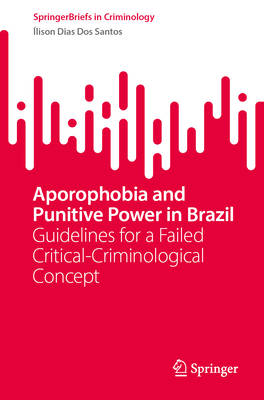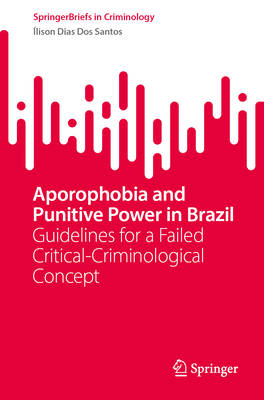
- Afhalen na 1 uur in een winkel met voorraad
- Gratis thuislevering in België vanaf € 30
- Ruim aanbod met 7 miljoen producten
- Afhalen na 1 uur in een winkel met voorraad
- Gratis thuislevering in België vanaf € 30
- Ruim aanbod met 7 miljoen producten
Zoeken
Aporophobia and Punitive Power in Brazil
Guidelines for a Failed Critical-Criminological Concept
Ílison Dias Dos Santos
€ 48,45
+ 96 punten
Omschrijving
This book provides a critical and reflective analysis of the criminological movement to establish aporophobia as a framework for examining punitive power. It scrutinizes the theoretical, methodological, and political foundations of aporophobia, a concept developed in a distinct sociopolitical reality and reveals the risks of uncritically applying it to Brazil's context. It highlights how aporophobia fails to account for the central role of Brazil's history of slavery in shaping its abysmal penal selectivity, which disproportionately targets marginalized groups perceived as social pariahs. By obscuring these structural roots, this movement inadvertently legitimizes Brazil's unchecked punitive power, perpetuating the belief in criminal law as a solution to deeply embedded social issues--ultimately reinforcing what is identified as a criminology of blindness that ignores the roots of the abysmal selectivity of punitive power in Brazil. Rooted in critical criminology, the book highlights the limitations of aporophobia as a critical-criminological tool and proposes an alternative framework grounded in intersectionality and Southern epistemologies. These perspectives emphasize the importance of delegitimizing criminal law as a mechanism for addressing social inequalities while constructing a more realistic and emancipatory critique of punitive power. It also exposes the criminal policy of the "other", a caste-based model that erodes the rule of law, even under the punitive new left. Ultimately, the work calls for a criminological approach that engages directly with Brazil's historical and systemic inequalities, offering a globally informed yet locally grounded analysis of the selective exercise of punitive power.
Specificaties
Betrokkenen
- Auteur(s):
- Uitgeverij:
Inhoud
- Aantal bladzijden:
- 86
- Taal:
- Engels
- Reeks:
Eigenschappen
- Productcode (EAN):
- 9783032017529
- Verschijningsdatum:
- 2/10/2025
- Uitvoering:
- Paperback
- Formaat:
- Trade paperback (VS)
- Afmetingen:
- 156 mm x 236 mm
- Gewicht:
- 176 g

Alleen bij Standaard Boekhandel
+ 96 punten op je klantenkaart van Standaard Boekhandel
Beoordelingen
We publiceren alleen reviews die voldoen aan de voorwaarden voor reviews. Bekijk onze voorwaarden voor reviews.








